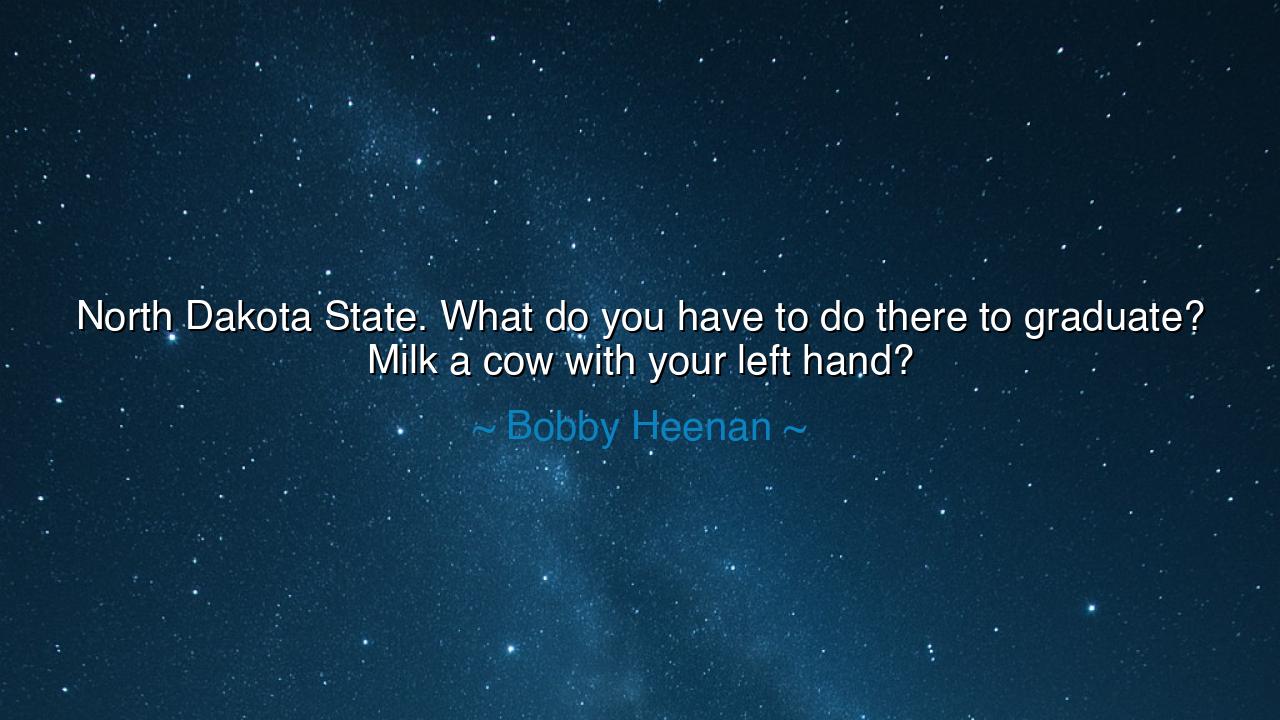
North Dakota State. What do you have to do there to graduate?
North Dakota State. What do you have to do there to graduate? Milk a cow with your left hand?






In the jesting yet sharp-edged words, “North Dakota State. What do you have to do there to graduate? Milk a cow with your left hand?” Bobby Heenan, the legendary wrestling commentator and wit, reveals not merely a joke, but a deeper reflection on how society often measures intellect, worth, and prestige. Though wrapped in humor, his quip speaks to an enduring human tendency — to judge others by the reputation of their origins, rather than the content of their effort. Beneath his laughter lies a mirror, held up to a world that still equates greatness with glamour and mocks the humble as though simplicity were ignorance.
The origin of this quote comes from Heenan’s long career as a wrestling manager and commentator, where humor was his weapon and insight his hidden edge. Known as “The Brain,” Heenan was not merely a clown of the arena — he was a philosopher in disguise, using comedy to expose human vanity. His remark about North Dakota State University, though meant as banter, underscores the irony of how people undervalue places, professions, and people that are tied to the earth. To ask if one must “milk a cow with your left hand” to graduate is to caricature simplicity — yet in doing so, Heenan forces us to confront our bias against the rural, the practical, the unpretentious.
For ages, the so-called “civilized” have mocked the “provincial,” believing wisdom only grows in marble halls or bustling cities. But history tells a different story. Abraham Lincoln, born in a log cabin and raised among fields, taught himself by firelight and rose to lead a nation torn apart. George Washington Carver, who grew up enslaved and learned from the soil itself, became one of the world’s greatest agricultural scientists. They both came from places that others might have sneered at — yet they carried more wisdom than the polished elites who dismissed them. What the world calls provincial, Heaven often calls pure.
Heenan’s humor, like that of the ancient jesters, carried a double meaning. In medieval courts, the fool was the only one permitted to speak truth to kings — hidden in laughter, his words pierced deeper than any advisor’s counsel. Likewise, when Heenan teased a university known for its practical education, he wasn’t merely mocking — he was provoking reflection. His jest suggests a truth that is older than any school: that the measure of learning is not in prestige, but in usefulness. To “milk a cow with your left hand” may seem trivial to the scholar, but it is a symbol of self-reliance — of knowing how to work, to live, to sustain life with one’s own hands.
In the style of the ancients, we must see this not as mockery, but as parable. For the world of the mind and the world of the hand are not opposites, but complements. The philosopher plows ideas; the farmer plows soil. Each contributes to the civilization that feeds both body and spirit. When Heenan’s joke is stripped of its laughter, it becomes a lesson about humility — that wisdom wears many faces, and that no place, however small or rustic, is without its teachers. Even the act of milking a cow — a symbol of patience, rhythm, and care — holds more philosophy than many books.
The story of Socrates comes to mind — the man who claimed to know nothing, yet through questions revealed truth. He taught in the marketplace, not the academy; he spoke to craftsmen, soldiers, and mothers, finding wisdom in their daily lives. In the same way, those who live close to the land often hold insights that cannot be taught in classrooms: endurance, gratitude, and the cycles of creation. These lessons are not printed in textbooks, but written in the turning of the seasons and the labor of honest hands.
The lesson, then, is clear: never mock the simple, for simplicity is the mother of wisdom. A degree is not proof of enlightenment, and the soil of a humble town may yield more greatness than the stone of any university. The true education of man lies not in his diploma, but in his diligence; not in where he studies, but in how he lives.
The practical action is this: seek wisdom everywhere — in the scholar’s book, yes, but also in the farmer’s field, the worker’s hand, the mother’s patience. Respect the knowledge that sustains life as much as the knowledge that entertains it. Laugh, as Bobby Heenan did, but let your laughter carry awareness, not arrogance. For when the laughter fades, and the applause ends, the truth remains: the world belongs not to those who boast of what they know, but to those who keep learning — even if that learning begins with a cow, a field, and a willing heart.






AAdministratorAdministrator
Welcome, honored guests. Please leave a comment, we will respond soon